 Petzlover
Petzlover Grand Basset Griffon Vendeen is originated from France but Jug is originated from United Kingdom. Grand Basset Griffon Vendeen may grow 9 cm / 4 inches higher than Jug. Grand Basset Griffon Vendeen may weigh 13 kg / 29 pounds more than Jug. Grand Basset Griffon Vendeen may live 3 years less than Jug. Grand Basset Griffon Vendeen may have more litter size than Jug. Grand Basset Griffon Vendeen requires Moderate Maintenance. But Jug requires Low Maintenance
Grand Basset Griffon Vendeen is originated from France but Jug is originated from United Kingdom. Grand Basset Griffon Vendeen may grow 9 cm / 4 inches higher than Jug. Grand Basset Griffon Vendeen may weigh 13 kg / 29 pounds more than Jug. Grand Basset Griffon Vendeen may live 3 years less than Jug. Grand Basset Griffon Vendeen may have more litter size than Jug. Grand Basset Griffon Vendeen requires Moderate Maintenance. But Jug requires Low Maintenance
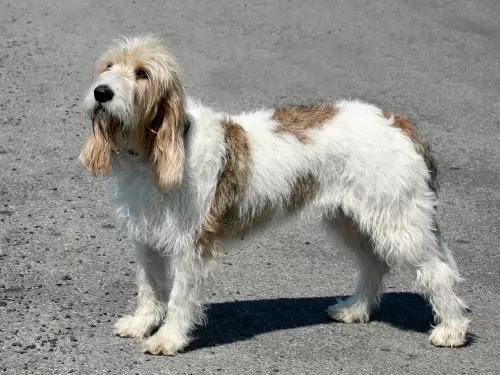 The Grand Basset Griffon Vendeen is a French scenthound that has changed over many centuries and today the area in France where they originate from, has contributed to the dog's looks.
The Grand Basset Griffon Vendeen is a French scenthound that has changed over many centuries and today the area in France where they originate from, has contributed to the dog's looks.
The rocky and thorny region of Vendeé required a hardy breed of dog. Also, hunters wanted a slower hound that they could keep up with, and the idea was to shorten the legs of the dog.
By the end of the 19th century, the Basset Griffon Vendéen was developed. By the 1950s, the Grand was considered a separate breed. and Petit was not banned until 1977.Today the dog is a long-backed and short-legged hunting dog.
 The Jug is a crossbreed – a mix of a pug and a Jack Russell Terrier and they were bred in England with the idea to keep the basic features of a pug but just with a longer nose.
The Jug is a crossbreed – a mix of a pug and a Jack Russell Terrier and they were bred in England with the idea to keep the basic features of a pug but just with a longer nose.
Details on the origin of the dog are not altogether clear but the dog was developed so that it would reduce the breathing problems that pugs and other flat-faced breeds are known for.
This isn’t an old breed and development started around the 1960s. It is one of the most recent breeds to be registered by the American Canine Hybrid Club.
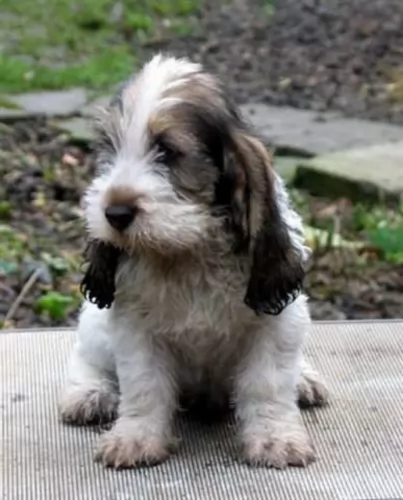 Kept today essentially as a domestic pet, the Grand Basset Griffon Vendéen is a strongly built dog, a rough-coated scent hound of medium size standing at roughly 39 to 45cm in height and weighing 18 to 20kg.
Kept today essentially as a domestic pet, the Grand Basset Griffon Vendéen is a strongly built dog, a rough-coated scent hound of medium size standing at roughly 39 to 45cm in height and weighing 18 to 20kg.
The coat is medium length, shaggy and wiry. It is essentially white with orange markings. Sometimes he can be tri-colored, having a combination orange, black or tan markings. The Grand Basset Griffon Vendeen’s coat is double with a thick, weather-resistant undercoat and a rough, harsh topcoat. In addition to regular brushing, this breed’s coat needs to be hand-stripped once a year.
His legs are straight, and he is longer than he is tall. He is a deep chested dog with long ears and a long tail. He is also noted for his mustache and beard with long eyebrows.
Your Grand Basset is a courageous, happy, confident dog, active and having great stamina.
He is a social, pack dog so he will be wanting plenty of time spent with his owner, failing which the owner should invest in another dog too. He will get on great with children and he is also a pet-friendly breed who will get on well with cats too. He is sharp and alert and responds well to training and socialization.
 The Jug will usually end up having a round head with the typical short muzzle of the Pug. He may be somewhat lighter in build than the Pug, taking more after the Jack Russell in this regard.
The Jug will usually end up having a round head with the typical short muzzle of the Pug. He may be somewhat lighter in build than the Pug, taking more after the Jack Russell in this regard.
The way the dog turns out will depend on which dog the puppy takes after. He is a small breed dog standing at between 25 to 36cm at the withers and weighing 5 to 7kg.
When it comes to coat color you'll find they can vary between fawn, black, apricot and sometimes a blend of two colors. While pugs come with smoothish coats, the Jack Russell can either have a smooth or rough coat and your Jug could inherit either a smooth or rough coat.
He could inherit the Pug’s flat, somewhat wrinkled face while others may have a slightly longer muzzle. The eyes are large and the ears are floppy. The legs are short and the tail will no doubt be left long these days and be slightly curled.
The tenacious, fearless, intelligent nature of the Jack Russell Terrier mixed with the entertaining, amicable nature of the pug has brought out the Jug dog with a whole lot of excellent qualities of both dog breeds.
They are loving, loyal dogs and when they are trained and socialized they get on particularly well with both pets and children in the the home. He is intelligent and will be able to learn some simple commands such as sit, stay and lie down.
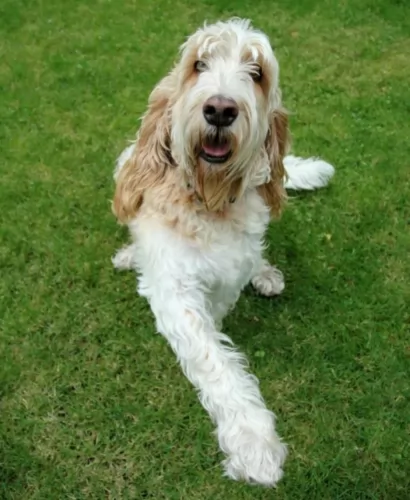 This long-backed, short legged hunting dog has a happy, confident personality.
This long-backed, short legged hunting dog has a happy, confident personality.
While he was used originally for hunting, he is now commonly kept as a companion dog. He is energetic and independent and will require you having him join you for walks and a ball game too.
Non-aggressive and adaptable he can live in the city or in the countryside so long as he receives plenty of attention and love – then he'll be a splendid pet.
 Jugs are wonderful little dogs and they make a good choice for first time dog owners as they don’t come with any difficult characteristics.
Jugs are wonderful little dogs and they make a good choice for first time dog owners as they don’t come with any difficult characteristics.
They’re playful, intelligent, energetic and amicable and just love to please their human family. Because of his small size, he is also an adaptable dog, being able to settle down in the city or the country, as long as he is given enough mental- and physical exercise to prevent boredom and frustration.
Provide the right environment for your Jug and you’ve got an awesome canine friend for life.
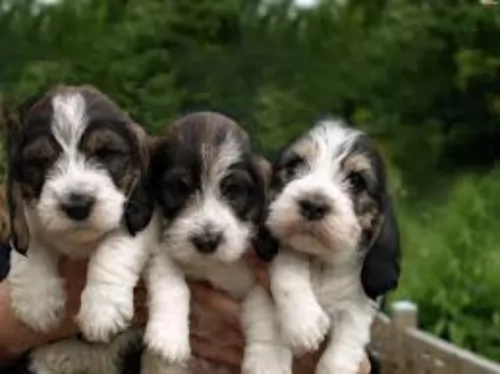 There are some Basset Griffon Vendéens that have reached 17 years of age. This is excellent for these dogs and lifestyle, nutrition and exercise can all play a part in the longevity of any dog.
There are some Basset Griffon Vendéens that have reached 17 years of age. This is excellent for these dogs and lifestyle, nutrition and exercise can all play a part in the longevity of any dog.
Generally they live to be 10 to 14 years of age. While he is a pretty robust dog, you'll want to be aware of some of the diseases which may require veterinary intervention -
Cancer is a major cause of death in elderly dogs, but if caught early, the dog can be cured. These cancers can be malignant lymphoma, skin cancer, bone cancer or soft tissue sarcomas. You'll notice a lump on your pet or a wound they won't heal. When you notice your dog not feeling well, get him to the vet.
A common form of heart disease in dogs is valvular disease, heartworm disease and myocardial disease. The signs of heart disease in your pet will depend on the severity of the disease and type. As heart disease moves on to congestive heart failure, you'll notice symptoms such as difficulty with breathing, fatigue, loss of appetite and weight loss. You need to get your dog immediately to the vet.
Dog allergies can be caused by pollen, medications, food or insects. You'll notice your pet scratching, he'll have watery eyes and inflamed skin. This inflammatory condition can cause a lot of agony for your pet, driving him mad with pain and the desire to scratch and lick. Relieve his discomfort by getting him to the vet as soon as possible.
 Your jaunty little Jug can live anything from 12 to 20 years when looked after well.
Your jaunty little Jug can live anything from 12 to 20 years when looked after well.
Just like with any other dog however, he can become ill, and then you will need to get him to the vet as soon as possible. Allergies, breathing problems, bloat, primary lens luxation, skin disorders, deafness, cardiomyopathy and obesity are just some of the common dog diseases that your Jug might have to deal with.
Because one of the dogs used in the development of the Jug is a Pug, as a brachycephalic breed, they could suffer with breathing problems. The Jug which inherits the shorter muzzles can suffer from a condition known as Brachycephalic Airway Syndrome.
Some Jugs can have the large, protruding or bulbous eyes of the Pug. With an eye problem known as Entropion, the lid of the eye can turn inward so that the eyelash pushes into the eyeball, causing lots of redness, discharge and irritation. This can lead to an infection in the eye. You may notice your Jug constantly pawing at his eye.
This can be a real problem for your Jug and the extra weight will put additional strain on the dog’s heart and other organs and also affect his overall health and wellbeing.
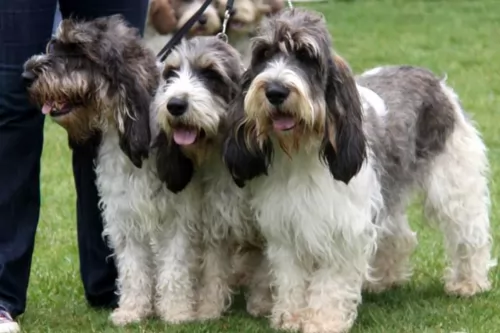 If you are going to be feeding your Grand Basset Griffon Vendéen kibble, there are excellent brands that bring out breed-specific formulas for age, size and energy levels of dogs.
If you are going to be feeding your Grand Basset Griffon Vendéen kibble, there are excellent brands that bring out breed-specific formulas for age, size and energy levels of dogs.
Feeding a dog is an individual choice, but good food can increase his longevity. A bit of raw meat mixed into his kibble, or some cooked brown rice, vegetables and chicken will be excellent for him. This can be a tasty variety to his diet.
Fresh, cool water must always be available at all times.
The Grand Basset Griffon Vendeen’s coat is double and the rough, harsh coat will need brushing twice a week and stripped once a year.
 Small he may be, but the Jug is an energetic little dog who will require exercising to keep him content. Toys to chew on are good and you can take him for walks too. Throw a ball for him or let him tug on a rope.
Small he may be, but the Jug is an energetic little dog who will require exercising to keep him content. Toys to chew on are good and you can take him for walks too. Throw a ball for him or let him tug on a rope.
To keep your little Jug healthy and happy, you want to be sure that his diet is made up of a balanced mix of vitamins and minerals. If you feed him a commercially manufactured food, make sure that its one of the best ones free of toxic colorants and preservatives.
Check on the packaging for portion sizes for your pet. Give him some home-made food too such as cooked chicken, rice, pasta and vegetables and try to also include some raw meat mixed into his kibble from time to time. Fresh, cool water should always be included day and night.
With healthy food, your Jug can make it to 17, 18, 19 or 20 years of age even. Remember that anytime you get a pet, you can check with your veterinarian for dietary recommendations.
The Jug can shed quite a bit, particularly if he inherited more of the Pug coat. Make sure you brush his coat at least twice a week to rid him of loose hairs. Brushing also strengthens the bond between you and your pet.
Recognize the signs of an ear problem. These can be redness or swelling, ear scratching, head shaking or ear discharge.
To keep his teeth and gums healthy you can provide him with safe, appropriate toys to chew on as well as dental chews recommended by your vet.
Check your dog’s eye health. Signs of an eye problem are eye discharge and redness. Take your pet to the vet as soon as possible and try and remove hair around the eye that could be causing irritation.